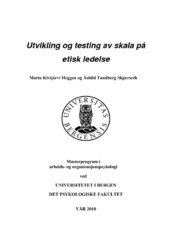Utvikling og testing av skala på etisk ledelse
Master thesis
Permanent lenke
https://hdl.handle.net/1956/4009Utgivelsesdato
2010-05-14Metadata
Vis full innførselSamlinger
- Faculty of Psychology [527]
Sammendrag
I denne masteroppgaven vil utvikling og testing av en ny etisk ledelsesskala (EL) samt rasjonale for dette presenteres. Den empiriske forskning på etisk ledelse er mangelfull. Dette kan skyldes et vitenskapelig ideal om en "verdifri og objektiv" forskning, men også mangel på instrumenter innenfor feltet som måler ansattes opplevelse av etisk ledelse. Herav ble en eksplorerende studie gjennomført med hensikt å utvikle en ny skala på etisk ledelse. Et utvalg på 586 respondenter og en referansegruppe (N=7) deltok i studien. Eksplorerende faktoranalyse, reliabilitetsanalyser og inter-item korrelasjoner indikerte en to-faktorstruktur av EL. Disse to faktorene bestod henholdsvis av lederes rettskaffenhet og omsorg for ansatte. EL demonstrerer høy indre konsistens (Cronbachs Alpha = .94). Begrepsvaliditet, konstrukt-validitet og diskriminant validitet fremstår som tilfredsstillende ettersom EL og konstruktiv og destruktiv lederatferd i tillegg til EL og variabler for arbeidsforhold, korrelerte i henhold til forventninger. Det konkluderes med at etiske perspektiver burde inkluderes i ledelses-forskning. Implikasjoner for videre forskning og praktisk bruk av EL behandles. In this master’s thesis the development and testing of a new ethical leadership scale (EL) together with the adherent rationale is presented. The empirical research of ethical leadership is scarce. This may be due to a scientific ideal of being an “objective researcher free of values”, but also because of the lack of instruments in the field measuring employees’ perceptions of ethical leadership. Hence, regarding the latter, an explorative study was conducted in order to start developing a new scale of ethical leadership. A sample of 586 respondents and a reference group (N=7) participated in this study. Exploratory factor analysis, reliability analysis and inter-item total correlations indicated a two-factor structure of EL. These two factors comprised leader justice and care for employees, respectively. EL demonstrates high internal consistency (Cronbach’s alpha = .94). Face-validity, construct and discriminate validity seem satisfactory as the relationship between EL and constructive and destructive leadership behavior, as well as between EL and variables of work conditions, correlated in accordance with hypothesized directions. It is concluded that ethical perspectives should be included in leadership research. Implications for further research and practical use of the EL are outlined.
Utgiver
The University of BergenOpphavsrett
Copyright the author. All rights reservedThe author
